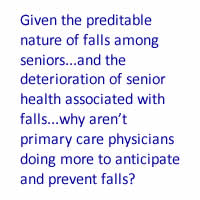March 14th, 2011 by DrWes in Health Policy, Opinion
No Comments »

 Give me your medication list and I’ll tell you your health problems. It happens every day in emergency rooms across the country as confused elderly patients present for an acute problem unable to describe their past medical history, but equipped with a list of medications in their wallet:
Give me your medication list and I’ll tell you your health problems. It happens every day in emergency rooms across the country as confused elderly patients present for an acute problem unable to describe their past medical history, but equipped with a list of medications in their wallet:
Metformin = Type-2 diabetes
Synthroid = Hypothyroidism
Lipitor + Altace + Lasix + Slo-K = Ischemic cardiomyopathy
Lexapro = A little anxious or depressed
Viagra = Well, you know…
I bet I’d be right better than 90 percent of the time. Now, imagine you’re a pharmaceutical company wanting to target people with those chronic diseases. Where might you find them?
No problem. Just pay the insurers to provide you patients’ drug lists. No names need be exchanged in keeping with HIPAA requirements. But the drugs list attached to folks’ cable TV box? Perfect. You’re in — with no legal strings attached. Then, according to the Wall Street Journal, just fire away with that targeted direct-to-consumer advertising on TV, courtesy of your local healthcare insurance provider.
No wonder our healthcare industry movers and shakers love the electronic medical record. Healthcare privacy? What healthcare privacy?
-WesMusings of a cardiologist and cardiac electrophysiologist.
*This blog post was originally published at Dr. Wes*
March 3rd, 2011 by StevenWilkinsMPH in Opinion, True Stories
No Comments »

We hear about stories like this all time: An elderly person falls and breaks something — a hip, a wrist, or an arm. Soon what once was a healthy, independent senior begins an inexorable downhill slide. Such is the case of my 89-year-old mother who recently fell and broke her wrist.
Turns out that 30 percent of people age 65 and older fall each year. Predictably, seniors with the following risk factors are more prone to falls:
- Using sedatives
- Cognitive impairment
- Problems walking
- Urinary tract infection
- Eye problems
- Balance issues
Similarly, when a person does fall, a cascading series of predictable clinical events occurs. It even has a name: “Post-fall syndrome.” This syndrome is characterized by things like fear of falling again, increased immobility, loss of muscle and control, lack of sleep, nutritional deficits, and so on. Seniors susceptible to falls also have higher rates of hospitalization and institutionalization.

What strikes me about falls among the elderly is that they are seemingly predictable events. And once a fall does occur, the consequences seem pretty predictable as well — enter post-fall syndrome. So if falls and their consequences are so predictable, why aren’t primary care physicians more proactive in terms of:
- Preventing falls?
- Treating post-fall syndrome?
In the case of my mother, her primary care physician and orthopedist were both very diligent at treating her episodic needs (i.e. her pain and broken bones). But little attention, if any, was given to assessing her long-term needs, such as nutrition, inability to do anything with her left hand (she’s left-handed), sensitivity to new medications (she never took drugs because they make her loopy), gait analysis, and depression counseling. Read more »
*This blog post was originally published at Mind The Gap*
November 24th, 2010 by Toni Brayer, M.D. in Better Health Network, Health Tips, News, Research
No Comments »

New clinical trials and published research are giving us information on how to improve health in elderly patients. Here are some brief points from the Cleveland Journal of Medicine that were surprising to me:
— Each year 30 percent of people age 65 or older fall and sustain serious injuries so preventing falls and fractures is important. Vitamin D prevents both falls and fractures, but mega doses of Vitamin D (50,000 mg) might cause more falls. A better dose is 1,000mg a day in people who consume a low-calcium diet.
— Exercise boosts the effect of influenza vaccine.
— The benefits of dialysis in older patients is uncertain, as it does not improve function in people over age 80. We don’t even know if it improves survival. Older patients who receive dialysis for kidney failure had a decline in function (eating, bed mobility, ambulation, toileting, hygiene, and dressing) after starting treatment.
— Colinesterase inhibitors (Aricept, Razadyne and Exelon) are commonly used to treat Alzheimer disease, but they all can have serious side effects. Syncope (fainting), hip fractures, slow heart rate, and the need for permanent pacemaker insertion were more frequent in people taking these drugs. The benefits of these drugs on cognition is modest.
— A new drug called Pradaxa (dabigatran) will likely prove to be safer than Coumadin (warfarin). Over two million adults have atrial fibrillation and the median age is 75. The blood thinner warfarin is critical for prevention of strokes but it caries a high risk of bleeding and drug levels have to be monitored frequently. Dabigatran will probably replace warfarin, but it will probably also be a lot more expensive.
As I often say, medicine and science are constantly changing and evolving. As new evidence comes forth, physicians and patients need to re-evaluate they way we do things.
*This blog post was originally published at EverythingHealth*
Give me your medication list and I’ll tell you your health problems. It happens every day in emergency rooms across the country as confused elderly patients present for an acute problem unable to describe their past medical history, but equipped with a list of medications in their wallet:














